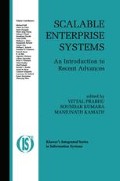Abstract
Methods of improving scalability in online auctions include limiting the number of bidding opportunities, providing price information to users, and recommending auctions that may be of interest to the users. We constructed an experimental prototype auction system in the context of reverse logistics for electronics products. Experiments were designed to test the effects of the number of trading opportunities and the amount of previous price and bid information presented to users. The participants’ profits improved with the number of trading opportunities but showed mixed effects for increasing price and bid information. The induction of decision trees for an auction recommender is illustrated along with the use of attribute selection to reduce the size of the tree.
Access this chapter
Tax calculation will be finalised at checkout
Purchases are for personal use only
Preview
Unable to display preview. Download preview PDF.
References
Aha, D. W., and Bankert, R. L. (1996). A comparative evaluation of sequential feature selection algorithms. In D. Fisher & J.-H. Lenz (Eds.), Artificial Intelligence and Statistics V. New York: Springer-Verlag.
Basu, C., Hirch, H., and Cohen, W. (1998). Recommendation as classification: using social and content based information for recommendation. In Proceedings of the National Conference on Artificial Intelligence.
Breese, J., Heckerman, D., and Kadie, C. (1998). Empirical analysis of predictive algorithms for collaborative filtering. In Proceedings of the 14 th Conference on Uncertainty in Artificial Intelligence.
Breiman, L., Friedman, J., Olshen, R. and Stone, C. (1984). Classification and Regression Trees. Wadsworth International Group, Monterey, CA.
Caruana, R., and Freitag, D. (1994). Greedy attribute selection. In Proceedings of the Eleventh International Conference on Machine Learning, pp. 28–36. New Brunswick, NJ: Morgan Kaufmann.
Covisint.com (2001). Accelerating the pace of business. http://www.covisint.com/downloads/print/overview.pdf (October 29, 2001).
Good, N., Schafer, J.B., Konstan, J.A., Borchers, A., and Sarwar, B. (1999). Combining collaborative filtering with personal agents for better recommendations. In Proceedings of the National Conference on Artificial Intelligence.
Hall, M. A. (2000). Correlation-based feature selection for discrete and numeric class machine learning. Proceedings of the Seventeenth International Conference on Machine Learning, Stanford University, CA. Morgan Kaufmann Publishers.
Kim, Y. S., Street, W. N., and Menczer, F. (2000). Feature selection in unsupervised learning via evolutionary search. In Proceedings of the 6th ACMSIGKDD International Conference on Knowledge Discovery and Data Mining.
Kokkinaki, A. I., Dekker, R., de Koster, M. B. M., Pappis, C. and Verbeke, W. (2001a). From e-trash to e-treasure: how value can be created by the new e-business models for reverse logistics. In EURO 2001, the Operational Research Conference, Rotterdam.
Kokkinaki, A. I., Dekker, R., Lee, R., Pappis, C. (2001b). An electronic marketplace for PCs in reverse logistics networks. In 2nd European Conference E-COMM-LINE, Bucharest.
Kumar, M. and Feldman, S. (1998). Internet auctions. In Proceedings of the Third USENIX Workshop on Electronic Commerce, Boston, MA.
Lin, W., Alvarez, S.A. and Ruiz, C. (2000). Collaborative recommendation via adaptive association rule mining. In Proceedings of ACM WEBKDD 2000.
Liu, H. and Motoda, H. (1998). Feature Selection for Knowledge Discovery and Data Mining. Kluwer, Boston.
McAfee, R. and McMillan, J. (1987). Auction and bidding. Journal of Economic Literature, 25, 699–738.
Modrzejewski, M. (1993). Feature selection using rough sets theory. In P.B. Brazdil, editor, Proceedings of the European Conference on Machine Learning, pp. 213–226.
Narendra, P. M., and Fukunaga, K. (1977). A branch and bound algorithm for feature subset selection. IEEE Transactions on Computers, 26(9), 917–922.
Olafsson, S. and Yang, J. (2001). Intelligent partitioning for feature relevance analysis. Working Paper, Industrial Engineering Department, Iowa State University, Ames, IA.
Quinlan, J. R. (1993). C4.5: Programs for Machine Learning. Morgan-Kaufmann, San Mateo, CA.
Resnick, P., Iacovou, N., Suckak, M., Bergstrom, P., and Riedl, J. (1994). Grouplens: an open architecture for collaborative filtering of netnews. In Proceedings of A CM CSCW′94 Conference on Computer-Supported Cooperative Work, 175–186.
Ryan, S., Min, J. and Olafsson, S. (2002). Experimental study of reverse logistics e-commerce. In Proceedings of IEEE International Symposium on Electronics and the Environment, San Francisco, 218–223.
Shardanan, U. and Maes, P. (1995). Social information filtering: algorithms for automating ‘word of mouth’. In Proceedings of ACM CHI′95 Conference on Human Factors in Computing Systems, 210–17.
Skalak, D. (1994). Prototype and feature selection by sampling and random mutation hill climbing algorithms. Proceedings of the Eleventh International Machine Learning Conference, pp. 293–301, New Brunswick, NJ: Morgan Kauffmann.
Teich, J., Wallenius, H. and Wallenius, J. (1999). Multiple-issue auction and market algorithms for the World Wide Web. Decision Support Systems, 26, 49–66.
Vucetic, S. and Obradovic, Z.. (2000). A regression-based approach for scaling-up personalized recommender systems in e-commerce. In Proceedings of ACM WEBKDD 2000.
Wurman, P., Walsh, W. and Wellman, M. (1998). Flexible double auctions for electronic commerce: theory and implementation. Decision Support Systems, 24, 17–27.
Yang, J., and Honavar, V. (1998). Feature subset selection using a genetic algorithm. In H. Motada and H. Liu, editors, Feature Selection, Construction, and Subset Selection: A Data Mining Perspective, Kluwer, New York.
Editor information
Editors and Affiliations
Rights and permissions
Copyright information
© 2003 Springer Science+Business Media New York
About this chapter
Cite this chapter
Ryan, S.M., Min, K.J., Olafsson, S. (2003). Experimental Study of Scalability Enhancement for Reverse Logistics E-Commerce. In: Prabhu, V., Kumara, S., Kamath, M. (eds) Scalable Enterprise Systems. Integrated Series in Information Systems, vol 3. Springer, Boston, MA. https://doi.org/10.1007/978-1-4615-0389-7_9
Download citation
DOI: https://doi.org/10.1007/978-1-4615-0389-7_9
Publisher Name: Springer, Boston, MA
Print ISBN: 978-1-4613-5052-1
Online ISBN: 978-1-4615-0389-7
eBook Packages: Springer Book Archive

